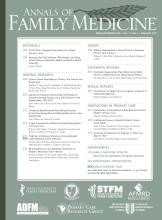Abstract
PURPOSE Six key elements of opioid medication management redesign in primary care have been previously identified. Here, we examine the effect of implementing these Six Building Blocks on opioid-prescribing practices.
METHODS Six rural-serving organizations with 20 clinic locations received support for 15 months during the period October 2015 to May 2017 to implement the Six Building Blocks. Patients undergoing long-term opioid therapy (LtOT) at these study sites were compared with patients undergoing LtOT enrolled in a regional health plan who did not receive care at the study sites but who resided in the same primary care service areas (control group). Outcomes were monthly trend in the proportion of patients undergoing LtOT prescribed a ≥100 morphine equivalent dose (MED) of opioids daily and the total number of patients receiving an opioid prescription. An interrupted time series using difference-indifference analysis was used for tests of significance.
RESULTS The proportion of patients prescribed a ≥100 MED of opioids daily decreased 2.2% (11.8% to 9.6%) among patients at the intervention clinics and 1.3% (14.0% to 12.7%) among patients in the control group. The rate of decrease was significantly greater among study patients than among patients in the control group (P = .018). The rate of decrease in the number of patients on LtOT at intervention clinics increased during the intervention period compared with the preintervention period (P <.001).
CONCLUSIONS Efforts to redesign opioid medication management in primary care resulted in a significant decrease in opioid prescribing. Future research is needed to determine if these results are generalizable to other settings and to assess implications for patient-reported outcomes.
- Received for publication September 24, 2018.
- Revision received February 22, 2019.
- Accepted for publication March 13, 2019.
- © 2019 Annals of Family Medicine, Inc.







